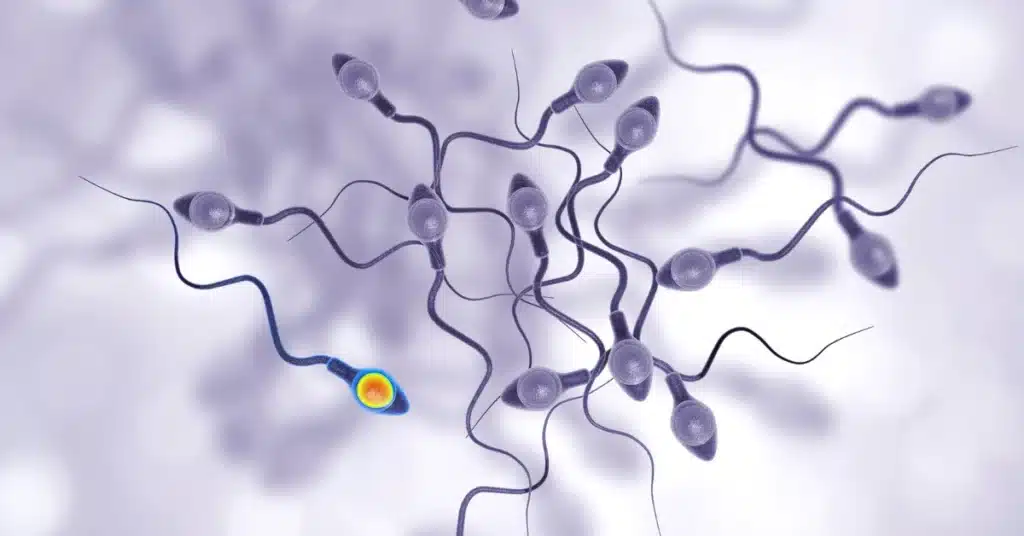Ejaculation is a natural and integral part of the human sexual experience. It brings pleasure and promotes reproduction.
It is a biological process that occurs due to sexual stimulation. Ejaculation in men and women has distinct differences and serves various purposes.
This article discusses the physiology and sensation of ejaculation in men and women.
It also addresses common ejaculation problems in men and questions surrounding this process.
What is ejaculation
Ejaculation is a physiological process that usually occurs due to sexual stimulation, leading to satisfying sensations.
In males, ejaculation involves the release of semen, which contains sperm, from the penis.
It is a crucial process in reproduction as it allows the transfer of sperm into the female reproductive system.
Ejaculation is less common among women. However, It involves fluid release from the Skene’s glands during sexual stimulation.
Female ejaculation
People often wonder “Do women ejaculate?” or is it just a myth. However, female ejaculation is real and quite common.
Female ejaculation is a physiological process that can contribute to sexual pleasure and orgasms and promote emotional satisfaction for some women.
It refers to fluid release from the Skene’s glands (female prostate) during sexual arousal and orgasm.
The fluid is typically a clear or milky liquid and may contain Prostatic-Specific Antigens (PSA) and other substances.
It is important to note that experiences of female ejaculation can vary significantly among people.
Female ejaculation fluid composition
Female ejaculation comprises various substances, including Prostatic-Specific Antigen (PSA), glucose, fructose, urea, and small amounts of urine.
The precise composition may vary among individuals, but the presence of PSA is a standard marker.
How does female ejaculation work
The mechanism of female ejaculation involves the stimulation of the Skene’s glands, which are located near the urethra.
During sexual arousal, these glands fill with fluid. Further stimulation causes the muscles surrounding the glands to contract.
It leads to the release of fluid through the urethra during orgasm.
Female ejaculation vs. squirting
Female ejaculation and squirting are often used interchangeably. However, a review by Clinical Anatomy explains that they are different phenomena.
Female ejaculation refers to the release of fluid from the Skene’s glands.
In contrast, squirting describes a larger volume of fluid released during sexual stimulation, which may include diluted urine.
Both experiences can be a pleasurable part of sexual expression.
Benefits of female ejaculation
Unlike male ejaculation, female ejaculation does not serve a specific purpose. It does not play a role in reproduction.
However, female ejaculation can produce enhanced sexual pleasure, increased intensity of orgasms, and potential emotional satisfaction.
It can promote a sense of empowerment, liberation, and self-confidence in varying degrees among different individuals.
Read: Discover everything you need to know about female ejaculation in our informative article. It addresses common questions, debunks myths, and clarifies all concerns about female ejaculation.
Male ejaculation
Male ejaculation is a natural process that occurs in response to sexual stimulation. It is often accompanied by an orgasm.
Male ejaculate, known as semen, is a complex mixture of fluids released during sexual activity. It occurs in two phases, including emission and ejaculation.
Male ejaculation plays a vital role in reproduction and fertility. Its benefits also include sexual satisfaction, emotional intimacy, and stress relief.
It is essential to understand the composition, process, age of onset, and benefits of male ejaculation.
Male ejaculate fluid composition
Male ejaculate, or semen, contains a mixture of seminal fluid and sperm.
Various accessory reproductive glands, including the seminal vesicles, prostate gland, and bulbourethral glands, produce the seminal fluid.
These organs contribute fructose, enzymes, prostaglandins, citric acid, and proteins to the semen, nourishing, lubricating, and protecting sperm.
How does male ejaculation work
Male ejaculation is a complex process that involves the central and peripheral nervous systems. It has two phases, including emission and ejaculation.
During the emission phase, the seminal fluid, which contains sperm, is released from the testicles.
It mixes with fluids from the seminal vesicles, prostate gland, and bulbourethral glands. This blend makes the sperm, which travels through the vas deferens and into the urethra.
The pelvic muscles contract in a rhythmic pattern, pushing semen through the urethra and out of the penis.
These contractions cause the release of neurotransmitters and hormones. It leads to pleasurable sensations experienced with ejaculation.
Typically, ejaculation occurs with intense physical and emotional pleasure, providing a sense of release and sexual satisfaction.
Recommended read: Dive deeper into the mechanism of ejaculation by reading our article: How Does Ejaculation Work: Everything You Need to Know
At what age does a man start ejaculating
Men typically start experiencing ejaculation during puberty, which may begin between 9 and 14.
The onset of ejaculation occurs due to hormonal changes, including the increased production of testosterone.
However, it is essential to note that the exact age of your first ejaculation can vary among individuals.
Genetics, overall health, and individual development can influence the time of the first ejaculation.
Benefits of male ejaculation
 Source: Science_Photo_Library
Source: Science_Photo_LibraryMale ejaculation is an essential physiological process with several benefits. It plays a vital role in reproduction and fertility.
Ejaculation also benefits sexual satisfaction, emotional connection, intimacy, and stress relief.
Reproduction: Ejaculation enables the transfer of sperm from the male reproductive system to the female reproductive system.
It enhances the possibility of fertilizing an egg with sperm and supporting reproduction.
Pleasure and sexual satisfaction: Male ejaculation is often linked to intensely satisfying sensations and is an integral part of the sexual experience.
During ejaculation, endorphins and other neurotransmitters release contribute to calmness, euphoria, and overall sexual pleasure.
Emotional connection and intimacy: Ejaculation commonly happens during intimate sexual activity. It can contribute to emotional connection and intimacy.
Stress relief: Ejaculation can relieve stress and temporarily escape daily pressures.
The pleasurable sensations and release of tension accompanying ejaculation contribute to relaxation and well-being.
While we discussed the potential benefits of ejaculation, you may also be curious about the potential advantages and risks of abstaining from ejaculation.
Resolve all your queries by reading: The Surprising Benefits of Not Ejaculating: What You Need to Know
What does ejaculation feel like
Ejaculation is a complex experience that can vary among individuals.
Factors such as personal preferences, arousal levels, relationship dynamics, and overall well-being can influence individual experiences.
But if you’re wondering, “Why does ejaculation feel so good?” it may be due to physical sensations and psychological aspects.
Physical sensations
During ejaculation, individuals typically experience rhythmic contractions in the pelvic region, specifically the genital area.
These contractions often accompany pleasurable sensations and a release of tension built up during sexual arousal.
The intensity and duration of these physical sensations can vary from person to person.
Psychological aspects
Ejaculation can also have psychological reactions and impact an individual’s emotional state. It often produces a sense of release, satisfaction, and euphoria.
It can provide a feeling of accomplishment and pleasure, contributing to a positive sexual experience.
Additionally, the emotional connection with a partner and feelings of intimacy can influence the psychological aspects of ejaculation.
Ejaculation disorders
Ejaculation disorders refer to conditions that involve difficulties or abnormalities related to ejaculation.
These include Premature Ejaculation, Delayed Ejaculation, and Retrograde Ejaculation.
While Premature Ejaculation describes ejaculating too early, Delayed Ejaculation describes ejaculating too late or not.
Retrograde Ejaculation, in contrast, affects the discharge of semen and impairs fertility.
Let us take a closer look at these common ejaculation problems.
Premature Ejaculation
 Source: atlasstudios
Source: atlasstudiosPremature Ejaculation (PE) is a condition that involves uncontrollable or rapid ejaculation that occurs with minimal sexual stimulation.
It typically happens before the person desires, leading to distress or dissatisfaction.
Various factors, including psychological, biological, and relationship-related factors, can cause Premature Ejaculation.
Premature Ejaculation treatment may include behavioral techniques, medications, or a combination of both.
Recommended read: Wondering how to delay ejaculation? Learn about potential ways to overcome PE and last longer in bed in our detailed article.
Retrograde Ejaculation
Retrograde Ejaculation occurs when the body redirects semen into the bladder instead of ejecting it through the penis during orgasm.
It occurs due to malfunctioning of the bladder neck muscles, which typically prevent the backward flow. Weak ejaculation is a common symptom of this condition.
Common causes of Retrograde Ejaculation may include certain medications, nerve damage, or surgical procedures.
Retrograde Ejaculation generally does not pose significant harm but may lead to infertility.
Treatment may include medications or techniques to enhance bladder neck function. Read: All About Retrograde Ejaculation Treatment to learn how to overcome this condition.
Delayed Ejaculation
Delayed Ejaculation is the difficulty or inability to reach orgasm and ejaculate despite adequate sexual stimulation. It may take an extended period or may not occur at all.
According to a 2016 study, the criteria for diagnosing Delayed Ejaculation include:
- A significant delay in ejaculation
- Weak ejaculation
- Infrequency or no ejaculation in 75-100% of sexual experiences during the course of 6 months
This condition can arise from physical factors, such as nerve damage or medication side effects.
It can also stem from psychological factors like performance anxiety or relationship issues.
Delayed Ejaculation treatment may involve therapy, medications, or a combination of approaches to address underlying causes.
Other ejaculation issues and post-vasectomy ejaculation concerns
In addition to common ejaculation disorders, some individuals may encounter other ejaculation challenges.
These may include discomfort or pain after ejaculation and the presence of blood in the semen.
People may also be curious about the potential impact of vasectomy on ejaculation. Let us discuss these concerns and questions.
Pain after ejaculation
Pain after ejaculation, or post-ejaculatory pain, can occur in some individuals. It may affect the genital region, lower abdomen, or pelvis.
Some individuals may also experience a burning sensation after ejaculation.
According to a 2020 study, the potential causes include inflammation or infection of the reproductive organs.
It can also arise from urinary tract issues, pelvic floor muscle dysfunction, and underlying medical conditions.
Consulting a healthcare professional is essential to diagnose the underlying cause and determine appropriate treatment options.
Recommended read: Learn how to combat pain during ejaculation. Check out – Overcoming Painful Ejaculation: A Guide
Blood in ejaculation
Hematospermia, or blood in ejaculation, is a symptom that can cause distress for some individuals.
Potential causes could involve inflammation or infection of the prostate, seminal vesicles, or urethra, trauma to the genital area, or underlying medical conditions.
Blood in semen can also be a sign of a Urinary Tract Infection (UTI) or a Sexually Transmitted Infection (STI).
Seeking advice from a healthcare professional is essential, as additional investigation may sometimes be necessary.
Ejaculation after vasectomy
 Source: Fabián_Montaño_from_Fabián_Montaño
Source: Fabián_Montaño_from_Fabián_MontañoA vasectomy procedure involves the surgical alteration of the vas deferens to prevent sperm from reaching the semen.
According to the American Journal of Men’s Health (AJMH), it is a safe and effective method of contraception.
A vasectomy does not affect ejaculation. It still occurs after the procedure. However, the ejaculate typically does not contain sperm.
If you experience changes in ejaculation after vasectomy, you should seek medical attention.
Ejaculation — in summary
Ejaculation is a natural part of the human sexual experience, regardless of gender. It refers to the release of semen from the penis in men and fluid from the Skene’s glands in women.
In men, it plays an essential role in fertility and reproduction. It also provides pleasure and satisfaction.
Female ejaculation, on the other hand, does not contribute to reproduction. However, it has several benefits, including increased sexual pleasure and intense orgasms.
Understanding the physiology of ejaculation can help individuals understand their experiences and address concerns.
Addressing misconceptions and encouraging open discussions can promote a more balanced and inclusive perspective on ejaculation.
It can lead to better sexual well-being and satisfaction.
Frequently Asked Questions
How to stop ejaculation?
Techniques like the stop-start or squeeze techniques can help stop Premature Ejaculation.
These techniques involve interrupting sexual stimulation right before the urge to ejaculate, helping to extend sexual activity. Edging or the stop technique can also help people to not ejaculate at all.
How to increase ejaculation?
Ensuring proper hydration, adopting a healthy lifestyle, and engaging in regular sexual activity may contribute to potential increases in semen volume.
Is ejaculation healthy?
Yes, ejaculation is a natural and healthy physiological process. It helps maintain reproductive health, provides sexual release and pleasure, and can contribute to emotional well-being.
How many sperm is present in one ejaculation?
The average ejaculate typically contains a significant number of sperm, ranging from 40 to 150 million per milliliter. However, the precise number of sperm in ejaculation can differ depending on various factors, including overall sperm count and individual fertility.
Why does ejaculation feel so good?
Ejaculation triggers the release of endorphins and other pleasure-inducing chemicals in the brain. It is accompanied by intense physical sensations and emotional satisfaction, contributing to the pleasurable nature of the experience.
When referencing outside resources, GoodrxMedicine always provides full citations. To learn more about the measures we use to maintain the quality of our content, please review our Content Information Policy.











